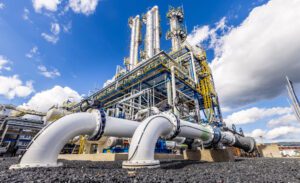The ORLEN Unipetrol Group (Prague, Czech Republic) has commissioned a new production unit for dicyclopentadiene (DCPD), which will expand its product portfolio. DCPD, a liquid hydrocarbon, has a broad range of applications in the automotive industry, construction, electrical engineering, medicine, and pharmaceutical sectors. ORLEN Unipetrol will produce up to 26,000 metric tons per year (m.t./yr) of DCPD, making it one of the four largest producers in Europe. Interestingly, dicyclopentadiene will be made using a method developed by ORLEN Unipetrol researchers in collaboration with the University of Chemistry and Technology in Prague. The investment in the construction of the new production unit totalled CZK 831 million. Twenty new jobs were created to ensure this new production.
“There is high demand for this product on global markets. In Europe, there is currently a deficit in DCPD production capacity. We expect demand to increase by an additional 26 per cent, by 40 per cent in American markets and by 60 per cent in Asian markets by 2030. The implementation of our own production technology allows us to use the flexibility of the unit and produce a product in a wide range of qualities from basic technical DCPD to highly pure DCPD for more demanding applications, for example for the production of transparent substances,” explains Tomasz Wiatrak, chairman of the ORLEN Unipetrol Group’s board of directors. He adds: “A close collaboration of our researchers with academia fundamentally contributes towards our technological development, and especially our co-operation with the University of Chemistry and Technology in Prague has been at a high level for a long time.”

Orlen Unipetrol opens a new production unit and becomes one of the four largest dicyclopentadiene producers in Europe (Source: Orlen Unipetrol)
The technological process of isolating DCPD from the so-called pyrolysis gasoline was developed within a long-term strategic project using the steam cracker’s by-products. “The project’s objective was to find a way to isolate hydrocarbons that are created as by-products in the petrochemical production units, have a higher added value and can be well used on the market. DCPD is one such case. Together with the team led by Professor Josef Pašek from the University of Chemistry and Technology in Prague, we designed a suitable production method and created a technology to isolate DCPD in a wide range of commercial quality levels, with the installed capacity to represent approximately 25 per cent of Europe’s entire production,” says Tomáš Herink, a member of the ORLEN Unipetrol Group’s board of directors responsible for production, research and development.
“The collaboration of the University of Chemistry and Technology and ORLEN Unipetrol has had a long and successful tradition. Its origins date back to the 1990s. Our joint research and collaboration have always focused on developing technologies related to crude oil processing and petrochemistry. Therefore, the realisation of the technology to isolate DCPD developed by our experts is an excellent example of the connection between academia and industry,” says Pavel Matějka, rector of the University of Chemistry and Technology in Prague.
ORLEN Unipetrol will produce DCPD with a distillation purity between 80 and 94 per cent. Such a configured product will be used for further production of polymer materials, resins, and chemical specialities used, for example, in the production of wind turbine propellers, coloured asphalts, adhesives, dyes and pigments, automobile and maritime components and skeletons, fibre optic cables, special lenses, medical components, packaging materials and sanitary products for kitchens and bathrooms.